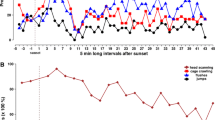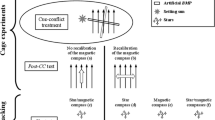Abstract.
In adult homing pigeons, the deflections induced by a 6-h clock-shift are often markedly smaller than predicted on the basis of the difference in sun azimuth. To look for possible reasons, we performed clock-shift experiments with adult pigeons, releasing birds with small bar magnets that interfered with their magnetic compass. Initial orientation and homing performance of control birds living in the natural photoperiod were not affected by the magnets in any way. Otherwise untreated pigeons whose internal clock had been reset by 6 h showed deflections that were about 60% of the predicted size. Brass bars did not affect the behavior of the clock-shifted birds. Magnets, however, increased the deflection significantly to about 90% of the predicted size; in the majority of releases, the confidence interval of the clock-shifted birds with magnets included the expected direction. These findings suggest that the reduced deflections observed in adult pigeons are to be attributed to the pigeons' use of their magnetic compass: when pigeons locate their home course, they seem to combine directional information from the sun compass with information from the geomagnetic field.
Similar content being viewed by others
Author information
Authors and Affiliations
Additional information
Electronic Publication
Rights and permissions
About this article
Cite this article
Wiltschko, R., Wiltschko, W. Clock-shift experiments with homing pigeons: a compromise between solar and magnetic information?. Behav Ecol Sociobiol 49, 393–400 (2001). https://doi.org/10.1007/s002650000313
Received:
Revised:
Accepted:
Issue Date:
DOI: https://doi.org/10.1007/s002650000313




